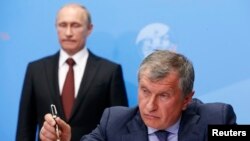Top Russian oil producer Rosneft said Chief Executive Igor Sechin would fly to Vienna on Nov. 25 for an energy market conference, just two days before OPEC meets in the city to debate the plunge in oil prices.
The state-backed company declined further comment on Monday, but the surprise announcement raised speculation in oil markets that Sechin, a close ally of Russian President Vladimir Putin, would meet with members of the Organization of the Petroleum Exporting Countries.
The oil market is waiting to see whether OPEC will agree a cut in production at its meeting on Nov. 27 to stem the near 30 percent drop in oil prices since June. Russia is the biggest oil exporter outside OPEC.
Oil and gas revenues account for half of Russia's government budget, and the drop in prices has badly hurt an economy already hit by Western sanctions over Ukraine.
Propping up the market
Sechin, as Russia's deputy prime minister, attended OPEC meetings in 2008 and 2009 when prices collapsed during the financial crisis, but Russia ultimately declined to participate in production cuts to shore up the market.
Russia is pursuing a policy of closer ties with other producers, analysts said, though few expect Moscow to push to join OPEC or participate in output cuts.
Rosneft said the oil conference was initially scheduled to take place in Venezuela on Nov. 21 and it was moved to Vienna “due to the initiative of the Venezuela side.”
OPEC-member Venezuela is one of the most vocal advocates of cutting output to support prices. Earlier on Monday Rosneft said that Sechin met Rafael Ramirez, Venezuela's vice president and foreign minister, in Moscow, and agreed on a commercial oil supply deal.
OPEC veteran Ramirez, who was Venezuela's energy minister until two months ago, has been on a diplomatic tour that includes Algeria, Iran, Qatar and Russia to strengthen bilateral relations and discuss oil markets ahead of the OPEC meeting.
Analysts are split over whether OPEC will take action to support the price when it meets next week, as the group struggles to address the rapid rise of shale oil output in the United States.
Several Russian oil executives and government officials have indicated they believe the drop in prices has been coordinated by Washington and Saudi Arabia, the largest OPEC member.





